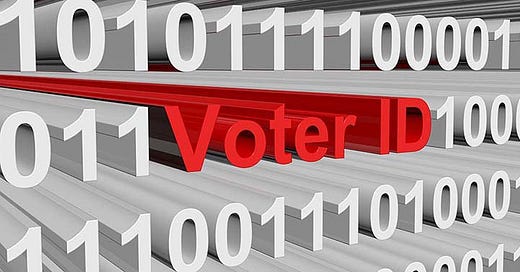Election Bills and Veto Lists, Pt. 2
Which election-related bills in the Virginia Assembly might meet Gov. Glenn Youngkin's veto pen? EPEC Team is combing through controversial measures that election-security groups are flagging.
EPEC Team reported in our last edition (Part 1) about election-related bills in Virginia’s General Assembly that have raised alarm bells among election-security working groups around the Commonwealth.
Some bills would impact the ability of registrars to maintain quality voter-registration lists; others would limit registrars’ authority, while others could create confusion for registrars to sort out from automated voter registrations via the Dept. of Motor Vehicles.
All of them appear to be on a glidepath for passing with slim Democrat majorities in the House of Delegates and Senate. Will they make Republican Gov. Glenn Youngkin’s Veto List?
Here's The Rundown in Part 2 (of 3), and why election groups are concerned about their impact:
1. Voter Registration Changes (or ‘ERIC-Lite’?)
-- HB 904 would address list maintenance activities with the introduction of a new “confidence score” to guide cancellation procedures in voter-list maintenance. It also impacts registrars’ ability to oversee voter list maintenance in their localities.
The bill “prohibits the use of voter data received from another state or jurisdiction or through a list comparison for list maintenance purposes when the data file does not include a unique identifier for each individual whose information is contained in the data file.” Translation: it limits the way the Dept. of Elections collects and compares out-of-state voter information to determine new and moved voters.
Other features underline existing procedures for notifying inactive and ineligible voters when a registration is canceled in accordance with the state’s Freedom of Information Act (FOIA) and the National Voter Registration Act (“Motor Voter”).
EPEC Team volunteers believe that one of the effects of HB 904, were it to become law, would be to slow many of Virginia’s modernization policies with voter-maintenance lists and data-sharing compacts undertaken with other states since the Commonwealth’s Dept. of Elections exited the Electronic Registration Information Center (ERIC).
Democrats have introduced a flurry of bills to force Virginia back into ERIC after it exited the controversial voter-list maintenance pact in 2023.
(See exit letter from Commissioner Susan Beals explaining why it left ERIC here. See Highlighted text changes of HB 904.)
A similar bill in the Senate, SB 315, would over-ride citizens’ options to “opt-out” of registering to vote through their DMV. The bills would automate it.
Under the bills, all interactions with the DMV would generate a registration record that is transmitted to Dept. of Elections without citizens’ consent. In effect, individuals would be units to be processed into voter registration lists.
Citizens have many opportunities to register to vote and participate in elections. But they also have the right not to participate if they are not eligible and want to avoid “accidental” registration that could jeopardize them legally. The margin for duplication and new layers of complexity have election-security groups concerned about the bills’ intent.
2. Voter Maintenance and Registrars’ Duties
--HB 26 further complicates an already confused approach to voter-ID “requirements” in Virginia by expanding the types of forms that would be accepted from private entities that are licensed or certified, such as nursing homes.
Virginia voters can already cast a ballot without an ID by signing an “attestation” form. Although the bill, and a similar one in the Senate (SB 300) sound civic-minded, election-security groups say the language is flawed in that it allows private entities to issue the IDs without checking residency requirements. See highlighted text changes here.
3. Second Amendment Rights and Polling Places
--HB 939 falls under the administration of elections but is aimed at restricting the Second Amendment rights of law-abiding gun owners by prohibiting the possession of a firearm within 100 feet of certain polling locations.
Civil rights groups sounded the alarm, calling the new restriction moving the 40-feet rule to 100 feet out from polling locations “excessive and unwarranted.”
After rounds of debate, lawmakers offered language that citizens would be in violation only if they “knowingly" wandered into the 100-foot zone of exclusion at a polling place.
Whether that satisfies citizens who call the bill another attempt to restrict their Second Amendment rights remains to be seen. See highlighted text changes.
There are more. EPEC Team is tracking them and following debates.
Your volunteers will be back tomorrow with more updates.
Plus, Early Voting analysis, as Virginia heads for “Super Tuesday” voting in the 2024 Presidential Primary on March 5th.
For now, that’s a wrap for this edition of EPEC Team’s newsletter. #



